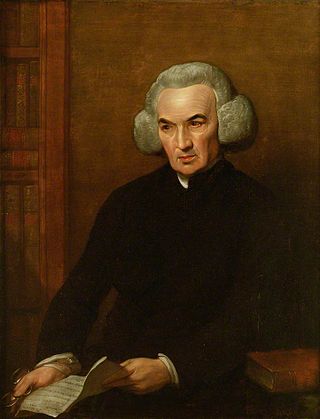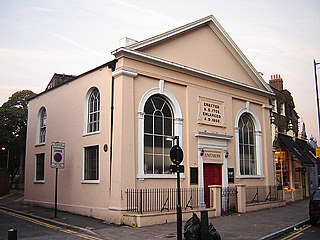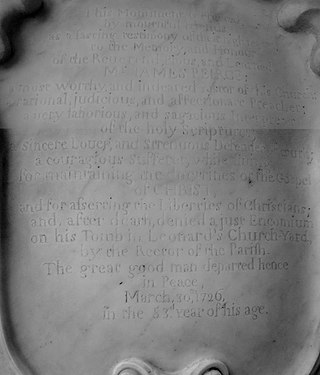Related Research Articles

Andrew Kippis was an English nonconformist clergyman and biographer.

Richard Price was a Welsh moral philosopher, Nonconformist minister and mathematician. He was also a political reformer and pamphleteer, active in radical, republican, and liberal causes such as the French and American Revolutions. He was well-connected and fostered communication between many people, including Thomas Jefferson, John Adams, George Washington, Mirabeau and the Marquis de Condorcet. According to the historian John Davies, Price was "the greatest Welsh thinker of all time".

Isaac Watts was an English Congregational minister, hymn writer, theologian, and logician. He was a prolific and popular hymn writer and is credited with some 750 hymns. His works include "When I Survey the Wondrous Cross", "Joy to the World", and "Our God, Our Help in Ages Past". He is recognised as the "Godfather of English Hymnody"; many of his hymns remain in use today and have been translated into numerous languages.
Thomas Rees, Welsh Nonconformist divine, was a Unitarian minister and scholar.

Samuel Chandler was an English Nonconformist minister and pamphleteer. He has been called the "uncrowned patriarch of Dissent" in the latter part of George II's reign.

Newington Green is an open space in North London between Islington and Hackney. It gives its name to the surrounding area, roughly bounded by Ball's Pond Road to the south, Petherton Road to the west, Green Lanes and Matthias Road to the north, and Boleyn Road to the east. The Green is in N16 and the area is covered by the N16, N1 and N5 postcodes. Newington Green Meeting House is situated near the park.

Dr Williams's Library is a small English research library in Gordon Square, Bloomsbury, London. Historically, it has had a strong Unitarian focus. The library has also been known as University Hall.

Newington Green Unitarian Church is one of England's oldest Unitarian churches, located on Newington Green, north London. The site has maintained strong ties to progressive political and religious causes for over 300 years, and is London's oldest Nonconformist place of worship still in use. The church was founded in 1708 by English Dissenters, a community of which had been gathering around Newington Green for at least half a century before that date. The church is operated by New Unity and is part of the General Assembly of Unitarian and Free Christian Churches.
The dissenting academies were schools, colleges and seminaries run by English Dissenters, that is, Protestants who did not conform to the Church of England. They formed a significant part of education in England from the mid-seventeenth to nineteenth centuries.

Joseph Towers was an English Dissenter and biographer.
Charles Morton was a British nonconformist minister and founder of an early dissenting academy, later in life associated in New England with Harvard College. Morton was raised with strong Puritan influences in England and attended Oxford (1649-1652). As a result of the English Revolution, he was arrested and excommunicated for promoting progressive education, forcing his immigration to relative safety in Massachusetts Bay Colony (1685-1686), although he was soon arrested for sedition in Boston.

The Dalston Synagogue was an Orthodox Jewish congregation and synagogue, located on Poet's Road, Canonbury, in the Borough of Islington, North London, England, in the United Kingdom. After formation in 1874, the congregation worshiped in the Poet's Road synagogue from 1885 until its closure in 1967. The congregation worshiped in the Ashkenazi rite.

Thomas Bradbury (1677–1759) was an English Dissenting minister.

James Peirce (1674?–1726) was an English dissenting minister, the catalyst for the Salter's Hall controversy.
Andrew Pritchard FRSE was an English naturalist and natural history dealer who made significant improvements to microscopy and studied microscopic organisms. His belief that God and nature were one led him to the Unitarians, a religious movement to which he and his family devoted much energy. He became a leading member of Newington Green Unitarian Church in north London, and worked to build a school there.
Thomas Kitson Cromwell (1792–1870) was an English dissenting minister and antiquary.
William Harris, D.D. was an English Presbyterian minister.

Samuel Wright (1683–1746) was an English dissenting minister.

Benjamin Grosvenor D.D. was an English dissenting minister.
Jeremiah Hunt, D.D. was an independent minister.
References
 This article incorporates text from a publication now in the public domain : "Biscoe, Richard". Dictionary of National Biography . London: Smith, Elder & Co. 1885–1900.
This article incorporates text from a publication now in the public domain : "Biscoe, Richard". Dictionary of National Biography . London: Smith, Elder & Co. 1885–1900.